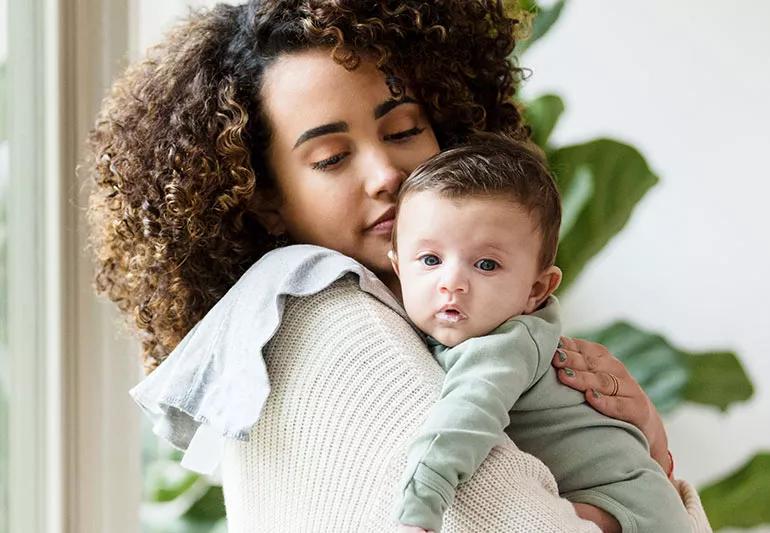What causes newborn hiccups — and how to stop them

Image content: This image is available to view online.
View image online (https://assets.clevelandclinic.org/transform/8e3877fd-d09c-4b26-a568-6a01450c1ce5/burpingBaby-1208596849_770x533_jpg)
mom burping baby
Your brand new baby has a serious case of hiccups. And while they’re a little bit adorable, you’re also wondering if there’s any cause for concern.
Advertisement
Cleveland Clinic is a non-profit academic medical center. Advertising on our site helps support our mission. We do not endorse non-Cleveland Clinic products or services. Policy
“Baby hiccups are very common, and they aren’t normally a problem,” says pediatrician Kylie Liermann, DO. “In fact, they usually bother parents more than the baby.”
To calm your new parent nerves a little, Dr. Liermann explains what causes baby hiccups and how to get rid of them so you (and baby) can breathe easier.
Hiccups are most likely caused by irritation to the diaphragm, the muscle at the base of the lungs. Sometimes, that muscle starts to spasm or cramp. That causes the vocal cords to clamp shut, creating that distinctive “hic!” sound you know and dread.
Developing babies can get hiccups even before they’re born, and many pregnant people have felt the telltale flutters in their bellies.
Hiccups are especially common in newborns and infants. “We don’t know exactly why, but hiccups may be caused by increased gas in the stomach,” Dr. Liermann says. “If babies overfeed or gulp air during eating, that could cause the stomach to expand and rub against the diaphragm, generating those hiccups.”
Usually, hiccups don’t bother babies. But sometimes, hiccups are a sign of gastroesophageal reflux (GERD). Reflux causes stomach acid to back up into the baby’s esophagus.
If your baby has GERD, hiccups won’t be the only symptom, Dr. Liermann says. Infants with reflux also have signs such as:
Advertisement
If you notice these signs, talk to your doctor about whether your baby might have reflux and how to manage it.
If your baby doesn’t have reflux symptoms, don’t stress over hiccups, Dr. Liermann says. But if those little “hics!” are bothering you, there are some things you can try.
Try feeding your little one in a more upright position, Dr. Liermann suggests. Propping your baby up on a pillow so they aren’t lying flat may help them take in less air at mealtimes.
“Burping usually helps with hiccups,” Dr. Liermann says. Burp your baby during feeding to prevent hiccups from striking. Try taking a burp break after 2 or 3 ounces.
If you’re nursing, burp your baby before you switch sides. If your nugget already has hiccups, you can try to relieve them with some gentle pats on the back.
Pacifiers can sometimes stop hiccups in their tracks. “The sucking motion can help relax the diaphragm,” Dr. Liermann explains.
Gripe water is an over-the-counter blend of herbs marketed as a treatment for colic and tummy troubles. Some parents find it helps with hiccups, too.
But above all, says Dr. Liermann: Don’t fret. “Hiccups stop on their own and don’t cause discomfort to babies. So don’t feel you need to treat them,” she says.
Advertisement

Delivered every Tuesday!
Sign up for our Health Essentials emails for expert guidance on nutrition, fitness, sleep, skin care and more
It's a letter about the news!
Learn more about our editorial process.
Advertisement
It’s never too early to teach your kids who strangers are and how to avoid unsafe situations
For starters, pick the right size backpack for your child, with wide, padded straps
Hydration and sleep are as important as avoiding dirty surfaces
Most chest pain in kids isn’t worrisome, but there are some symptoms that deserve attention
Maturity and safety matter more than age
Nightmares in children are common and more likely when your child is overtired or stressed
These visits include getting important vaccines and checking on developmental milestones
Listen to your child to help them identify their fear and name it, but don’t reinforce it
Type 2 diabetes isn’t inevitable with these dietary changes
Applying a hot or cold compress can help with pain
Pump up your iron intake with foods like tuna, tofu and turkey